
-12 June 2022-
The Most Holy Trinity
Gospel reading: John 16: 12-15
vs.12 Jesus said to his disciples: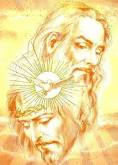
“I still have many things to say to you but they would be too much for you now.
vs.13 But when the Spirit of truth comes he will lead you to the complete truth, since he will not be speaking as from himself but will say only what he has learnt; and he will tell you of the things to come.
vs.14 He will glorify me, since all he tells you will be taken from what is mine.
vs.15 Everything the Father has is mine; that is why I said:
All he tells you will be taken from what is mine.”
*******************************************
We have four commentators available from whom you may wish to choose .
Michel DeVerteuil : A Trinidadian Holy Ghost Priest, director of the Centre of Biblical renewal .
Thomas O’Loughlin: He is on the theology faculty of Nottingham University
Sean Goan: Studied scripture in Rome, Jerusalem and Chicago and teaches at Blackrock College and
works with Le Chéile Schools.
Donal Neary SJ: Editor of The Sacred Heart Messenger
*********************************************
Michel de Verteuil
Lectio Divina The Year of Luke
www.columba.ie
General Textual comments
We meet two kinds of feasts in the liturgy. The most important are the mysteries, incidents in the life of Jesus which we enter into, experiencing them as living again in us – we have just completed the cycle of the Easter mysteries.
Now the Church invites us to celebrate three of the second kind of feasts – the Trinity, Corpus Christi, and the Sacred Heart of Jesus.
In these feasts we celebrate some aspect of our faith. It is a celebration, therefore, not an academic exercise. Meditating on the gospel texts chosen for each feast helps us enter into it.
It is particularly important to do this for the Trinity, because this doctrine is usually experienced as a mathematical sum to be learnt, rather than good news to be celebrated.
The gospel text for the feast this year will seem forbidding at first. But as with many of the teachings of Jesus recorded in St John’s gospel, if you read it imaginatively you will find that it will come alive.
Feel free to take the passage as you will, but it is good to let it speak to you about the Trinity. Jesus is the model of what believing in the Trinity does for us.
It is helpful to situate the passage in its context: it is a moment of separation, Jesus is giving his followers a last teaching before leaving them.
Lectio prayer
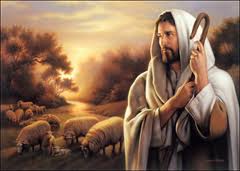 “Consult not your fears but your hopes and dreams.
“Consult not your fears but your hopes and dreams.
Think not about your frustrations but about your potential.” …John Paul II
Lord, as parents and teachers we tend to become self-important
– we think we have to tell our charges everything they need to know,
– preserve them from making mistakes,
– prepare them for every eventuality.
Help us to be humble like Jesus,
knowing that no matter how much we do for people,
there are always things that we still have to say to them,
but these things would be too much for them at this point in their lives.
We need not be anxious about that, because when the time comes,
the Spirit of truth will come and will lead them to the complete truth.
“Someone who knows his own weakness is greater than someone who sees the angels.”
…Isaac of Nineveh, Syrian monk of the 7th century.
Lord, there are many factions in the Church, each one thinking they have the complete truth.
Help us to be a Church modelled on your Holy Trinity,
aware that none of us possesses the complete truth
since that 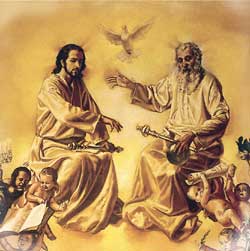 belongs to you alone.
belongs to you alone.
We do not speak as from ourselves,but only what we have received from you as your gift.
When we understand that, we can really prepare people for the things to come.
“When the archer shoots for no particular prize, he has all his skills;
when he shoots to win, he thinks more of winning than of shooting,
and the need to win drains him of power.” …Tranxu, Chinese sage
Lord, like Jesus, we need not be anxious for success.
Whatever happens in the future will glorify us
since it will be taken from what is ours.
That may seem a presumptuous thing to say, but it isn’t.
We say it because we know that everything you have is ours.
“My son, you are with me always, and all I have is yours.”…The father in the parable of the prodigal son, Luke 15:31
Lord, you treat us like members of your family, and share everything you have with us.
When we think we must earn goodness by our hard work,
– we become jealous of others;
– angry that they do not recognize what they owe us;
– self-righteous that our words have been proved right.
If, like Jesus, we remember that everything you have is ours, we rejoice in the gifts of others.

Lord, forgive us that as followers of Jesus,
we think we have a monopoly, or even a first option, on the truth.
Teach us to welcome truth wherever we find it;
remind us that Jesus was not possessive of the truth;
he knew that everything you have is his,
and so everything the Spirit would tell the world until the end of time
would be taken from what was his.
Lord, noble ideals are handed on to us by great people who went before us.
When we strive for those ideals, we glorify them, since all we do is taken from what is theirs.
“Nothing that happened in Eastern Europe in these last years would have been possible without the presence of this Pope.” …speaking of Pope St John Paul II, Former Soviet President Mikhail Gorbachev, March 1992
Lord, we thank you for Pope Paul II, Francis I and all spiritual people like them.
Guided by the Spirit, they do not speak as from themselves,
but say only what they have learnt, and so they tell the world of things to come.
****************************
Thomas O’Loughlin,
Liturgical Resources for Year C (Luke)
www.columba.ie
Introduction to the Celebration
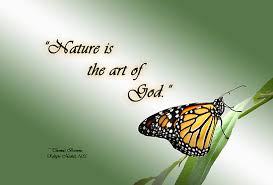
This feast is unique in that the focus of our celebration is not an aspect of the history of salvation, but reflection on the nature of God as we believe it has been revealed to us as Christians. Thus every Sunday is the Sunday of the Trinity, every feast, every action has a trinitarian dimension, and should any prayer be uttered or homily preached which does not include that core of faith — at least tacitly with a conclusion such as ‘through Christ our Lord’ — then we are apostates, have ceased to be Christians and become some sort of vague deists or unitarians who value the ‘message of Jesus’. At the outset of the celebration it is worth reflecting that today’s focus is the very essence of Christian identity. We have just stated that we are acting ‘In the name of the Father…’ and that is a declaration of our basic faith, not just an opening formula. Our aim in today’s liturgy should be to become more sensitive to the tririitarian cues that run right through our religion.
Homily Notes
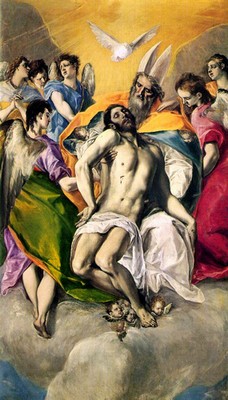 1. There is almost a tradition of beginning homilies today with: ‘this is the most difficult sermon of the whole year’, or ‘this is a mystery and I was never good at dogma in the seminary’, or some such deprecating remark which is ostensibly intended to emphasise that God is mystery,
1. There is almost a tradition of beginning homilies today with: ‘this is the most difficult sermon of the whole year’, or ‘this is a mystery and I was never good at dogma in the seminary’, or some such deprecating remark which is ostensibly intended to emphasise that God is mystery,
and defensively that actually speaking of ‘things divine’ is more demanding than commenting on the practical implications of belief. However, what is actually communicated is that what follows is really rather irrelevant and that you are only going through with the homily because it’s your job. In that case, no matter what you say, the congregation have switched off. Every teacher knows that if you tell a class that the next topic is awfully hard to understand it is a self-fulfilling prophesy; equally, if you tell the assembly that this is all very complicated, then they will decide that it is probably something they can live without – as they have successfully done until now.
In any case, what it required is not a mini-version of Augustine’s De Trinitate, but a recollection that to believe as we do, is to believe that in Christ we are caught up into the life of God, he shows us the Father, and sends the Spirit to dwell with us. Your task is not a lecture in dogma (so avoid’ arithmetical theology’ such as ‘I God, 2 Processions, 3 Persons, 4 Relations, 5 Notions’), but to bear witness in the assembly to what we believe to be the basic dynamic of life revealed in Christ.

God designed these beautiful flowers, so God must be beautiful.
2. One useful way to raise awareness of that dynamic is to draw people’s attention to the basic structures of the prayers we use in the liturgy.
3. But, first, it is useful to recall what we do not believe. We do not address a ‘God’ as if it is ‘us’ and ‘him over there’, as if our prayers were like letters to a distant ruler. That is a model of the God-humanity relationship that belongs to many religions (indeed it is a constant distraction for us too), but it does not reflect our basic confession. To talk of God as the ‘wholly other’ is to forget that Jesus Christ, the Son, wholly God, is wholly one with us.
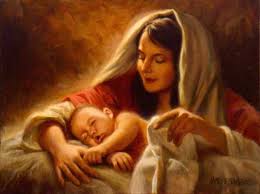
We are all called into life by God
4. We believe that we were brought into the life of God by Christ, when we were baptised into him. The Son reveals that he is distinct from the Father, he comes from the Father, he returns to the Father. The Son gathers us and the whole creation into his kingdom which he presents to the Father. The Son sends us the Spirit, the Spirit enables us to grow ‘in Christ’ and to call the Father, our Father. We see this in the opening prayer today: ‘Father, you sent your Word and your Spirit and through them we come to know the mystery of your life.’ This pattern of ‘from the Father’, ‘through the Son’, ‘in the Spirit’, and ‘to the Father’ can be found in virtually every prayer in the liturgy. A slightly larger example would be Eucharistic Prayer II. We address the Father throughout the prayer, who as the fountain of holiness sends us the Spirit. The Spirit enables us to remember Christ. Then we actually remember Christ and his thanksgiving/ offering (the institution narrative) which he made to the Father. Through the Son we stand in the Father’s presence and serve him, and ask him that as we ‘share in the body and blood of Christ’ we might ‘be brought together in unity by the Holy Spirit’.
5. To be baptised and to believe means that we enter into the trinitarian life of God, we profess this when we recite the creed. But the creed in its reciting form is derivative of the three-fold, question-and-answer form of baptism. This trinitarian aspect can be brought out more effectively today by replacing the recited creed with a renewal of baptismal promises as on Easter Day (Missal, p 220).
*********************************
3. Sean Goan
Let the reader understand
www.messanger.ie
Gospel
This short gospel from John’s Last Discourse highlights the pivotal role of the Spirit in making known the mystery of God. We should not imagine that the idea of the Trinity was something that the early church came to easily. The first Christians were Jews and they believed very much in God as one, so they had to grapple with the identity of Jesus that had been revealed to them. This they did, firmly believing that the Spirit was guiding them into the amazing truth about God.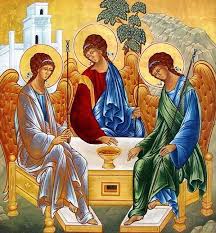
They came to see that God’s own inner life had been shown to them as Creator, Saviour and Sanctifier and that as believers they were being asked in some way to live out the life of love that had been made known to them.
The Gospel of John is a witness to this whole process.
Reflection
The gospel for today tells us that the Spirit of truth will lead us to the complete truth about God. Happily for us the gospel does not say when we will come to the complete truth. Perhaps this is because the evangelist knows full well that the God revealed by Jesus is not just a mystery to be solved. Every generation of Christians must make the effort to see where and how the God who creates, saves and sanctifies is speaking to us.
At the beginning of the third millenium it may well be that She is screaming at us through a hole in the ozone layer and in the voices of the hungry and oppressed who suffer so terribly in God’s beautiful world.
****************************************************
4. Donal Neary S.J.
Gospel reflections
www.messenger ie
Beginning of time – wisdom
Wisdom, truth and love seem to be the themes of readings today, and that love will lead to hope.
It’s a confusing sort of feast, as we cannot understand the truth of the Trinity But we can ‘hit’ it from different angles.
The wisdom of God has been born before the beginning of time. Somehow wisdom is essential to God – and is presented very often as female. In celebrating the Trinity we celebrate and ask for wisdom, which comes from the heart of God. So this wisdom is the sort of wisdom that comes from love.
Love is ‘poured’ into our hearts by the Spirit. Connected with love are qualities we would want to live by – courage and hope. These are the gifts of the Spirit as wisdom may be the gift of the Father.
Jesus is presented by the gospel as the source of truth. His also is the truth of love, as his truth is best seen on the cross, in his self-sacrificing love.
The most famous icon of the Trinity by Rugenev,( c/f icon above) well-known to us now, has the Trinity at a table and an empty space at the table for us all. In one sense they are not completed without us! We are part of their love, and their life of wisdom, truth and love, which they wish to share with us.
 Glory be to the Father and to the Son and to the Holy Spirit.
Glory be to the Father and to the Son and to the Holy Spirit.
As it was in the beginning, is now and ever shall be,
world without end.
Amen.
*************************************